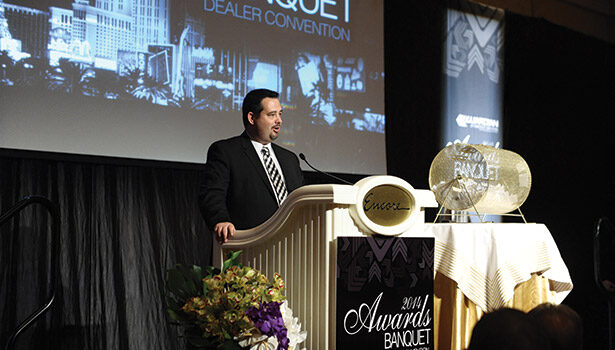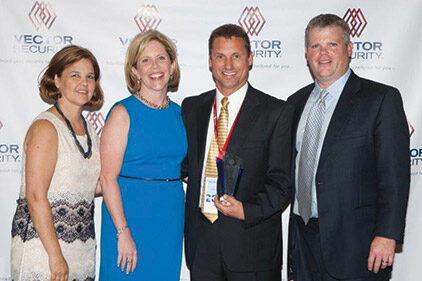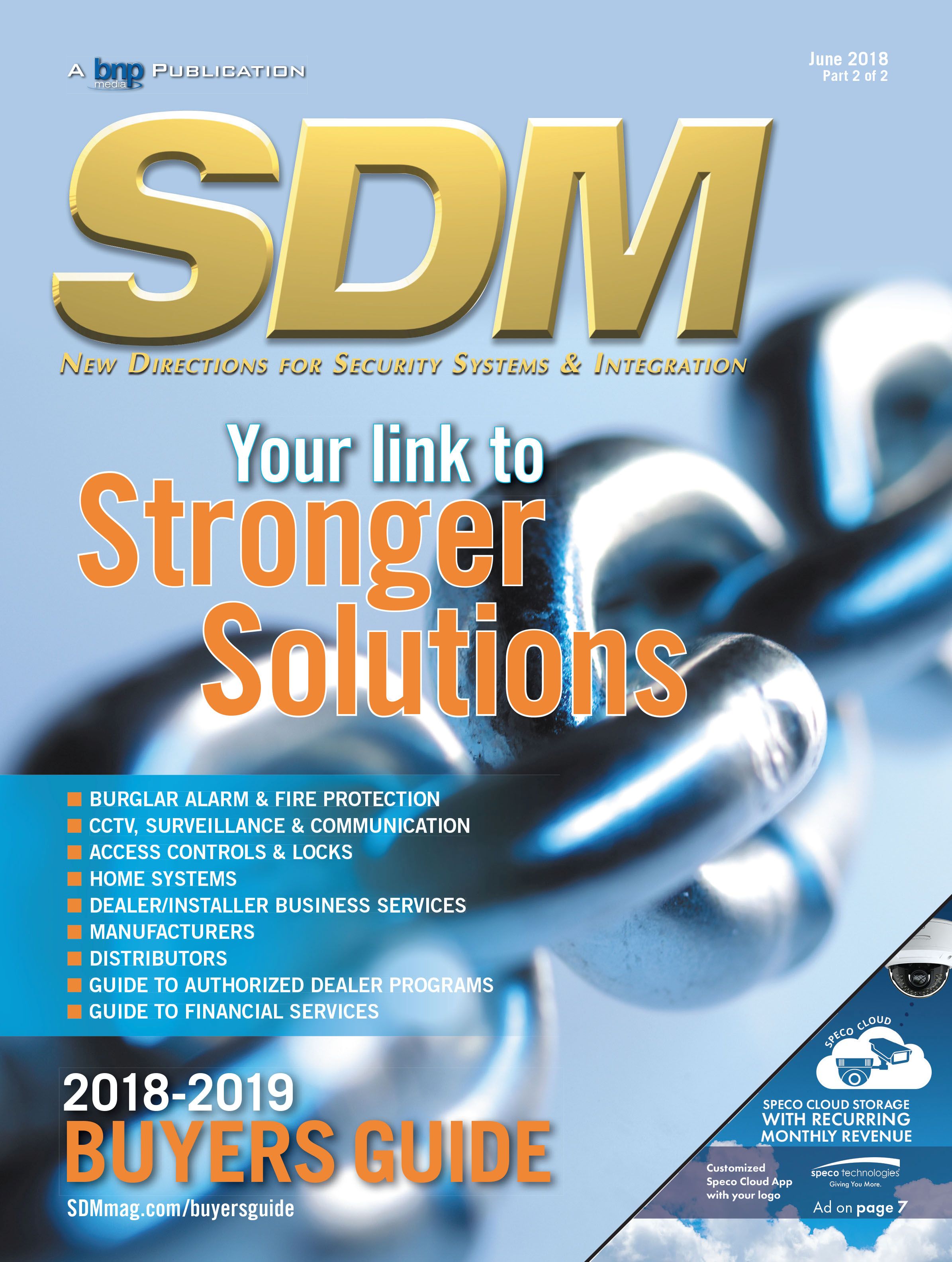Authorized dealer programs experienced a boom in the 1990s. The time was ripe for dealer programs, because mass-market residential security companies were making waves in the industry (ADT sold 180,000 new residential security systems in 1994 alone) and such programs were created to allow security dealers of any size to compete.
Today, 23 percent of security dealers participate in at least one authorized dealer program. And even with advancements in technology allowing for sales of home automation, residential video and other services, the same scenario of mass-market programs and low- or no-money-down system installations still exists, allowing dealer programs to thrive today and help dealers differentiate themselves in the marketplace and grow their businesses.
“What we saw back in the late ‘90s was mass-market programs for residential systems in full swing, and we recognized an opportunity to continue to develop business in that space by adding the external resources of outside dealers while leveraging our internal resources,” recalls Larry Wargo, executive vice president at Guardian Protection Services, Warrendale, Pa. The company rolled out its dealer program in 1995 and, to date, has 39 dealers.
Many dealer programs were born out of the need for security companies to create enough cash flow to continue operating their businesses. Selling off their accounts once generated, or receiving support in training, sales, billing and service, allowed — and still allows — many dealers to thrive instead of sell or shutter their business due to lack of cash flow or back-end support. In addition, many dealer programs also learned quickly that opportunities for the dealer to build equity and focus on long-term customers translated to a mutualistic relationship for all parties.
“A lot of companies were in the ‘sell as much as you can business’ back in ‘97, ‘98 and ‘99 and a lot of those companies are out of business,” says John Madden, vice president of Vector Security’s authorized dealer division, Pittsburgh, Pa. “One of the things that we know is that for most dealers, cash flow is an essential part of their business and even if companies can generate accounts for lower multiples, they still have to invest or reinvest their cash flow to keep some of their accounts. Selling off accounts gives dealers that cash flow, while, in our case, also allowing them to use our branding and resources like billing and customer service,” Madden explains. On the other hand, he said, Vector — whose dealer program has been around since the late 1990s and has approximately 55 members — also encourages some of its dealers to retain some of their own accounts as well, so that they can make the cash flow they need from selling accounts for day-to-day operations, while building equity by holding onto some of the accounts and generating long-term recurring monthly revenue (RMR).
Everyone Gets a Share
Today, an array of authorized dealer programs exists and fluctuates widely in operations and commitment, but they all share this common intent: to increase business for both themselves and their dealers. But the models only work if dealers bring in business. In traditional models of buying and selling accounts, not only must dealers generate business, but they must generate long-term accounts in order for the parent company to benefit and recoup its investment. From their inceptions and over the years, many dealer programs have mastered the ways in which they can help dealers increase that business by birthing incentives such as loans, revenue sharing, wealth-building options and strong back-end support.
One term that may be heard associated with dealer programs is revenue sharing, though the stipulations of how much, when a dealer receives it and for how long, differ widely from program to program. Aside from allowing the flexibility of its dealers to determine which accounts to keep and which ones to sell, Monitronics of Dallas, which dates its program back to 1994, gives its dealers up to 10 percent revenue shares on each sold account after month 13 for 96 months, according to Ernest Celedon, director of sales at the company. Monitronics also gives its 600-plus dealers support with funding, metrics and sales, he adds.
Tom Piston, vice president of business development at Dynamark Security Centers, Hagerstown, Md., said its dealer program, which was begun 30 years ago, also offers long-term revenue sharing based on low attrition rates and the flexibility to keep or sell accounts. “It makes for a much more stable partner and more solid business,” he describes. “If partners have their own stable account base, in addition to that necessary cash flow, they can weather the storm of a bad month or two.”
To encourage healthy competition and provide support to its dealers, ADT’s authorized dealer program provides a number of longer-term incentives such as revenue sharing, as well as shorter-term incentives to encourage sales, such as enhanced multiples with goals established and joint sales rallies with both indirect and direct sales channels, according to Jim Vogel, vice president of dealer business at ADT. To be in the program, which has more than 300 dealers across the United States, Canada and Puerto Rico, the dealer enters an exclusive selling agreement with ADT and, in exchange, gets use of the ADT brand, sales support and training.
In lieu of revenue sharing, Alarm Capital Alliance (ACA) of Newtown Square, Pa., offers a bonus structure, according to Kelly Bond, senior vice president of business development. “On active accounts, we provide annual bonuses based on low attrition numbers,” she explains. Bond refers to ACA, which launched its dealer program in 2008, as a financial partner for its dealers, which purchases accounts while allowing them to market, sell and service independently.
A loan option is something that some dealer programs have rolled out over the years as another way to encourage long-term partners by helping them build equity in their businesses. RMR Capital Group of Minneapolis started its program in 2012 by offering both loan and acquisition products. Its dealer base keeps their own brand identity and autonomy over vendors and other business choices and does not need to pledge exclusivity, according to Kris Kirby, president of the company. RMR Capital Group’s dealers can participate in the loan program as well as sell their aged or new accounts outright.
Kirby explains that the amount given for a loan against an account is lower than the purchase price of an account, making a mixture of the two something that some alarm dealers need in order to maintain cash flow and build equity. “We prefer dealers to use the loan because that indicates they are focused on building equity in their company, but for a lot of dealers, 100 percent loans just isn’t enough cash flow to cover their creation and operating costs and so this allows them to get the money they need, while also building value in their business,” Kirby said.
In addition to allowing dealers to sell their accounts outright or get accounts back after the terms expire, COPS Monitoring of Williamstown, N.J., offers a loan program using alarm contracts as collateral, according to Jim McMullen, president and COO of the company. “They have the freedom to fund as many or as few accounts to satisfy their particular need for capital,” he describes. In 2013, COPS Monitoring also unveiled a partnership with SS&Si, which provides its dealers with equipment purchasing discounts and equipment leasing.
In 2014, Guardian Protection Services announced a wealth-building option for its dealer program. “We wanted to offer our dealers the opportunity to hold accounts and generate long-term wealth for themselves,” says Brian Helt, vice president of dealer programs. “In lieu of selling 100 percent of their accounts to us, Guardian will lend them money to hold a portion of those accounts for their benefit.”
A Dealer’s Perspective: Effect on the Industry“I don’t think you would have the penetration rate in this industry without dealer programs. Back when we started [in 1998] to this day, it allows for an entrepreneurial spirit that drives this industry. Dealer programs have really allowed for the growth of more mom-and-pop operations to have the brand power of a program, support and infrastructure at your fingertips, as well as being able to provide the same services as anyone out there. It has really driven this business to the level that it’s at today.” — Mike Carvin, president of Spectracom Inc., Pennsauken, N.J., and a Guardian Protection Services authorized dealer since 2002
A Dealer’s Perspective: What It Takes to Succeed“To succeed in any dealer program, you have to write good customers and they have to be around for a long time. Part of the business model of any program is that there has to be some type of growth every single year being in the business of attrition that we are all in. For us, we still control our marketplace and our customers and that allows for a competitiveness that every healthy industry needs.” — Mark Sessa, owner of ASC Security USA, Riverside, Calif., and an ADT authorized dealer since 1998 |
Providing Support
Though some dealer programs operate with a buy/sell accounts model, there are many dealer programs that don’t buy or sell accounts at all, but rather focus on equipment sales or different types of support to differentiate themselves from other programs. The First Alert Professional authorized dealer program, for example (which dates back some 25 years to the ADEMCO days before Honeywell purchased the security company), has its 350 dealers contribute to a marketing fund so it can provide an array of business-growth initiatives, including training, marketing, technical support, and even helping develop compensation plans or design sales structures for their companies, says Marek Robinson, president of authorized dealer programs. Honeywell’s Commercial Security Systems authorized dealer program works similarly, Robinson adds. The idea behind this model is that dealers commit to growth targets and sales, and are rewarded with the ability to market themselves as an authorized dealer of the program and Honeywell brand.
With 275 authorized dealers, the AiN Group (Authorized Integrators Network), which is managing partner of GE Home & Security Technologies, does not buy or sell accounts either, but rather focuses on product commitments, and in return, give its dealers access to more than 40 manufacturers, brands and partner services, including Bose, Linear and Interlogix, as well as group-premium services, including insurance and financing opportunities. AiN Group does not charge membership fees, but rather benefits from rebate arrangements with its partner companies, explains Stan Matysiak, president of the Tampa, Fla., organization. In the near future, the group is planning to roll out retirement plans and medical benefits for dealers to offer their employees at prices they couldn’t otherwise obtain based on their individual sizes, he adds.
In a market with many different dealer program models and options, AiN further differentiates itself by specializing in the new construction market. In addition, AiN authorized dealers are able to use the GE Home & Security Technologies logo on marketing materials, giving them a well-recognized brand to market to consumers, Matysiak says.
Another dealer program that uses a loyalty model is Bosch. For its more than 200 dealers, Bosch Security Systems, Fairport, N.Y., has certification and training requirements as well as product volume requirements and, in turn, provides a number of benefits including trade show support, leads and marketing help, and of course, use of the Bosch brand, describes Tom Mechler, product marketing manager at the company. “The most sought-after tool is the dealer locator, which allows end users to search for certified dealers to install their products,” Mechler says. Dealers also can find one another for subcontracting help and other networking opportunities. Bosch will announce new benefits when it re-launches its dealer program in early 2015, Mechler told SDM at press time.
While SecureWatch24 (SW24) does not currently buy accounts from dealers, Jay Stuck, executive vice president and chief marketing officer for the New York-based company says that it does have plans to go that route “down the road.” In the meantime, SW24 zeros in on helping dealers make a mark with video service sales to increase RMR and long-term customers. “Video is the future and one of the ways we can aid our dealers in differentiating themselves from the competition is through education on how to sell video services,” Stuck says.
The aim of all of the different programs and how they operate may differ, but the end goal remains to make money for both the parent company and the independent dealer. For a dealer company looking for a potential program, it takes a lot of research, many conversations, and clear goals to determine the right match.
“In my mind, a good program allows the dealer to capture the lion’s share of the value they create, while mutually delivering superior services to the end customer,” notes Kirby of RMR Capital Group. “We can still make money while providing our dealers with a vehicle to build equity in their business.”





